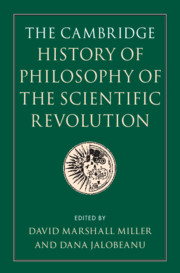13 results
Preface
-
- Book:
- The Cambridge History of Philosophy of the Scientific Revolution
- Published online:
- 14 January 2022
- Print publication:
- 06 January 2022, pp xiii-xiv
-
- Chapter
- Export citation
Introduction - The Disciplinary Revolutions of Early Modern Philosophy and Science
-
-
- Book:
- The Cambridge History of Philosophy of the Scientific Revolution
- Published online:
- 14 January 2022
- Print publication:
- 06 January 2022, pp 1-12
-
- Chapter
- Export citation
Part III - Problems and Controversies
-
- Book:
- The Cambridge History of Philosophy of the Scientific Revolution
- Published online:
- 14 January 2022
- Print publication:
- 06 January 2022, pp 313-452
-
- Chapter
- Export citation
Bibliography
-
- Book:
- The Cambridge History of Philosophy of the Scientific Revolution
- Published online:
- 14 January 2022
- Print publication:
- 06 January 2022, pp 453-523
-
- Chapter
- Export citation
Contributors
-
- Book:
- The Cambridge History of Philosophy of the Scientific Revolution
- Published online:
- 14 January 2022
- Print publication:
- 06 January 2022, pp ix-xii
-
- Chapter
- Export citation
Tables and Figures
-
- Book:
- The Cambridge History of Philosophy of the Scientific Revolution
- Published online:
- 14 January 2022
- Print publication:
- 06 January 2022, pp viii-viii
-
- Chapter
- Export citation
Copyright page
-
- Book:
- The Cambridge History of Philosophy of the Scientific Revolution
- Published online:
- 14 January 2022
- Print publication:
- 06 January 2022, pp iv-iv
-
- Chapter
- Export citation
12 - Experimental Natural History
- from Part II - Disciplinary Activities
-
-
- Book:
- The Cambridge History of Philosophy of the Scientific Revolution
- Published online:
- 14 January 2022
- Print publication:
- 06 January 2022, pp 222-237
-
- Chapter
- Export citation
Contents
-
- Book:
- The Cambridge History of Philosophy of the Scientific Revolution
- Published online:
- 14 January 2022
- Print publication:
- 06 January 2022, pp v-vii
-
- Chapter
- Export citation
Index
-
- Book:
- The Cambridge History of Philosophy of the Scientific Revolution
- Published online:
- 14 January 2022
- Print publication:
- 06 January 2022, pp 524-536
-
- Chapter
- Export citation
Part I - The Disciplines
-
- Book:
- The Cambridge History of Philosophy of the Scientific Revolution
- Published online:
- 14 January 2022
- Print publication:
- 06 January 2022, pp 13-146
-
- Chapter
- Export citation
Part II - Disciplinary Activities
-
- Book:
- The Cambridge History of Philosophy of the Scientific Revolution
- Published online:
- 14 January 2022
- Print publication:
- 06 January 2022, pp 147-312
-
- Chapter
- Export citation

The Cambridge History of Philosophy of the Scientific Revolution
-
- Published online:
- 14 January 2022
- Print publication:
- 06 January 2022



